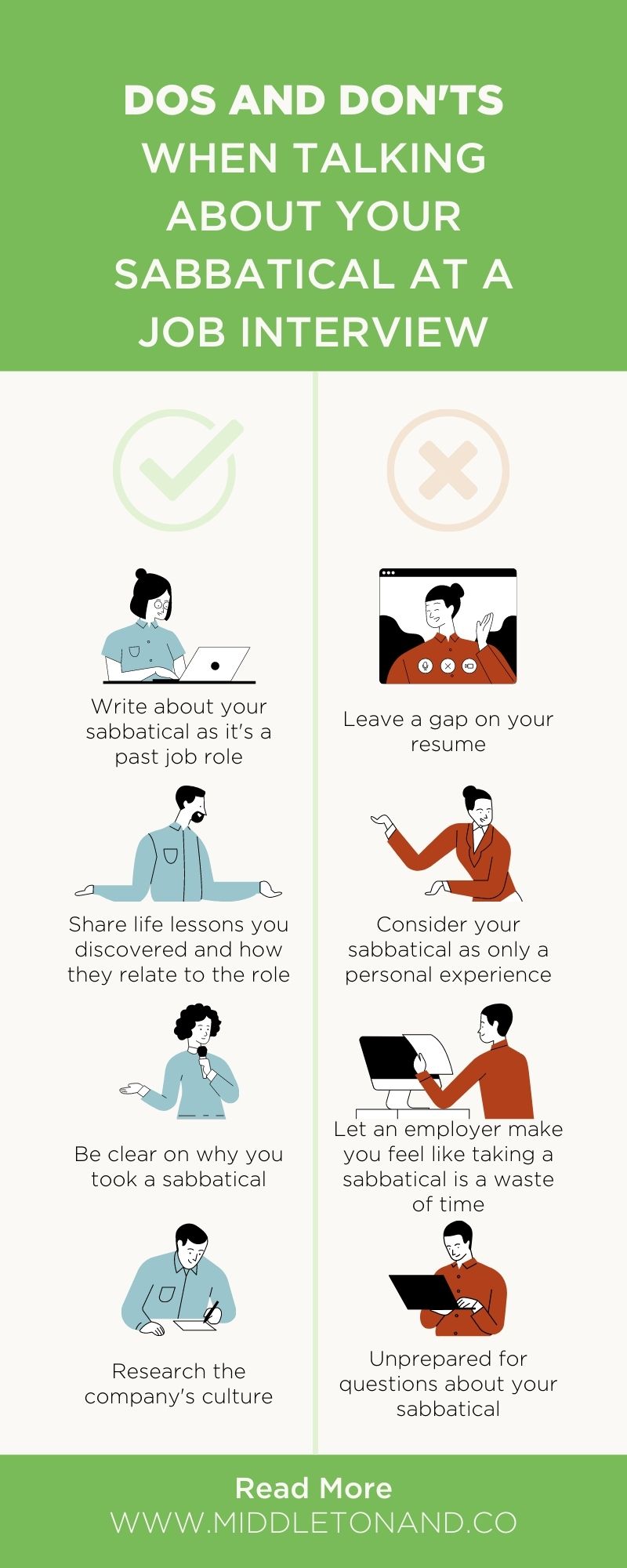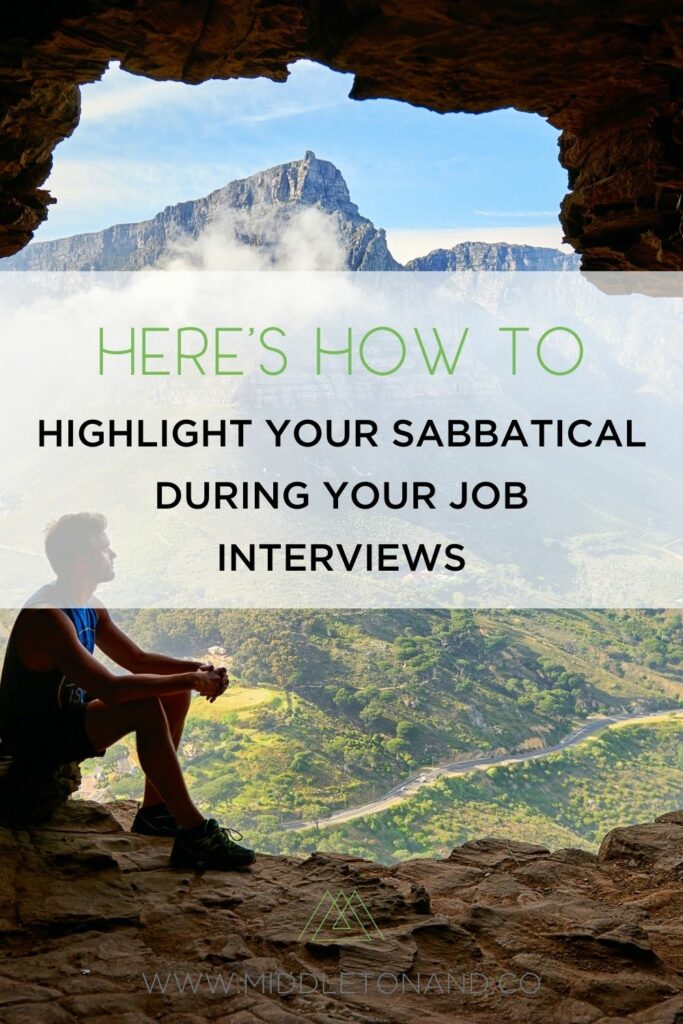With the job market’s competitive nature, coming back from your sabbatical can feel a little daunting!
On top of the regular stress that comes with interviewing for a new job, you may be wondering how you’re going to explain that one-year (or two!) gap in your resume.
Are you afraid future employers will see this gap as negative or unprofessional?
We’ve heard this argument before. People are scared to leave the job market because they believe it will look bad on their resumes.
But taking a sabbatical can actually BOOST your career. It can make you stand out from all the other candidates, give you some good examples to talk about when you get that first interview, and well, pretty much make you that much more interesting overall.
But only if you can present your sabbatical in the right way! We’re here to show you how!
Take control of the narrative and show how your sabbatical is a bonus that other candidates don’t have! Let’s get your CV on the top of the pile!

Do your research before the interview
Just like when you apply to any job, it’s important that your CV and what you will talk about during the interview relate to the job in question. To show that you are a good fit for a job, you want to make sure you really understand what they are looking for!
The best way to achieve success is to do your research about your preferred jobs and find out what kind of skill set they require. Then look into that list and think about how you used these skills during your sabbatical. You’ve used and improved a lot of skills during your time away, even if you weren’t paid to work.
Share what life lessons you discovered and how they relate to the role.
Also, make note of what they say about company culture. Now that you have a better idea of what types of environments you thrive in (and those that drain you), think about some good questions you can ask at the end of the interview to illustrate that you really are looking, not just for any job, but the right job for you.
Write about your sabbatical as though it’s a past job role
Don’t try to ‘hide’ your sabbatical. Highlight it! Having unclarified gaps in your CV may make a recruiter question your entire job application. It’s essential to be fully honest. Address the career gap directly – since it (hopefully!) had a very intentional purpose to begin with.
This is also your opportunity to be proud of the time you spent away and show how beneficial it has been for you!
Write about your sabbatical the same way you would describe a past job experience.
- Write a short title that explains your break, for example, One-Year Sabbatical: International Travel, Sabbatical: Family Care, Personal Development, MBA, Medical Reasons, etc.
- Showcase what you have done during your absence! You can put down things like attending workshops or training related to your industry, big projects you completed that required project management skills, and anything that you did that relates to your overall personal and professional development.
- Highlight the skills you have learned – traveling for a long time, for example, requires a lot of organization, problem-solving, flexibility, and personal leadership!

Personal development is professional development
Very often we separate the two, but you’d be surprised by how connected personal development and professional development really are. It’s our life experiences that shape who we are and how we show up at work.
Consider how your sabbatical has improved your energy and productivity. Or maybe you encountered a problem during your travels that required a unique personality trait, like problem-solving, strong follow-through, or negotiation skills? Thinking back on your experiences abroad, can you identify some examples of where your strengths really stood out? Or maybe you’ve been able to identify more clearly some of your weaknesses that you’ve made efforts to improve on? There are a host of life and personal skills that can boost your job application. You just have to think about them creatively!
Feeling stuck on where to start? Keep reading for a list of skills you may have learned abroad!
Examples of skills you may have acquired during your sabbatical
If you can’t think of skills you learned during your time abroad, let us inspire you a bit. Check this list and ask yourself if this applies to you. If it does, make sure to mention it during your interview. These are really valuable skills!
- Learned a new language in X months
- You now speak an additional language
- It also shows you are a fast learner
- Lived in a different culture
- It shows your adaptability to a different environment, which could be beneficial when working in a different work culture
- It shows your open-mindedness to people living differently than you
- It shows your ability to learn new processes and figure out how to navigate them
- It has given you a new perspective, a new way of thinking about and through problems because you spent time with people who think differently than you do
- Improved health & wellbeing
- You focused on your well-being and learned important lessons to balance your personal and professional life
- You know how to set boundaries so you can be an asset in the long term and avoid burnout
- You have skills that help you with mental clarity
- You volunteered
- You learned new skills doing something different
- You can work in a team
- It shows your values
- You traveled for a long period of time
- You had to make a lot of decisions on your own – it shows leadership and organizational skills
- You can work independently
- You are able to flex different skills in different circumstances
- You can be nimble
- You have strong research and analytical skills (think about what it took to navigate the visa process, or finding a place to live, or constant currency conversion)
- You’ve met new people around the world
- It shows you can easily connect with people
- You have the ability to build a network for yourself
- You are able to find common ground, even when you may have fundamentally different viewpoints
- Your social (and potentially professional) network is global
- You’re able to learn about people and history and develop your own opinions
- You’ve spent time understanding what you want in life
- You’ve gained a deeper sense of self-worth and self-confidence
- You’ve gained clarity on what you want from your job
- You have a better idea of what you are good at, and where you can be of most value
Above are just a few examples of how your sabbatical could have helped you grow.
Do the exercise for yourself. Write down all the challenges (small or big) that you’ve encountered and how you’ve solved them. Think about all the experiences and lessons you’ve learned. Now start making links with how those examples make you a better employee.

There are so many examples once you really think about it!
Pick 3 or 4 that relate to the role you are applying for and speak about them confidently and passionately. Remember that your energy also sells and supports you. A first interview is the best moment to highlight your readiness to take on new challenges.
What are some of the biggest lessons we’ve learned from taking a sabbatical? Find out here.
How to “justify” you haven’t worked for a while
Your focus should be on how your sabbatical has helped to shape you and improve certain areas of your life.
Be clear – both for yourself and if the question arises from the interviewer – on why you chose to take a sabbatical in the first place. What were you looking for? What were you hoping to learn? What needs were not being met, and what did you plan to do to fix it?
A sabbatical is essentially a big project that has a start, middle, and end. Sure, maybe you didn’t get paid during it, but that doesn’t mean it wasn’t purposeful and intentional. So make sure that’s at the forefront of the conversation.
Employees who want more than just money from a job can be really attractive to employers! It helps them to think about potential compensation packages more creatively too. For example, maybe instead of a bigger paycheck, you’d be happy with more flexibility in your work routine, like working remotely or getting unlimited vacation time, or a clearer professional path where you can grow and be challenged while working your way up in the company.
If you’re a person who can articulate what lights you up, clear expectations can be set on both sides of the table to ensure that you get the recognition and compensation that you need to do a good job, and in return, they get a loyal, driven employee to help them work towards the company’s goals.
Trusting that the right employer for you will understand the value of your time away will also help. Sabbaticals are becoming more and more popular in many industries and it is less ‘foreign’ to see them on people’s resumes.
Pay attention to red flags
If you’ve clearly explained why your sabbatical was beneficial, and the potential employer still has disapproving comments about it, consider it a red flag!
You spent a year (or more) working on yourself to be a better version of you. You’re fired up about the next thing. Make sure that next thing is the right thing.
You deserve to work in a company that not just understands this, but values this type of commitment! If they don’t, maybe it’s not the right fit.
Taking a sabbatical: will it ruin or grow your career? Learn more now
If you’re in the planning phase of your sabbatical, click here!
If you’d like support in navigating your re-entry into the workforce or how to integrate your sabbatical experience into your life moving forward, reach out to us!

Like this article? Make sure to Pin It so you can go back to it later!



